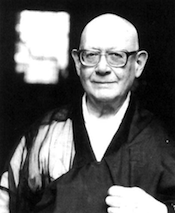Canoeing Up Cabarga Creek: Buddhist Poems
Philip Whalen
Parallax Press: Berkeley, 1996.
68 pp., $12.00 (paper).

Philip Whalen is probably best known as one of the readers introduced by Kenneth Rexroth at the Six Gallery in San Francisco forty years ago, an event that launched the Beat Scene in San Francisco. Presently the abbot of the Hartford Street Zen Center in San Francisco, Whalen’s magnificent poetry has remained largely invisible in literary America, turning up in Beat anthologies but virtually ignored by the literary mainstream.
I would nevertheless assert Whalen’s rightful place among the most vital and original poets of the past half-century. This slim volume presents a selection of overtly Buddhist poems written between 1955 and 1986, and while it is, poem by poem, a treasure trove, I couldn’t help but wish for a more generous selection.
Why, for instance, is Whalen’s marvelous poem “For Brother Antoninus” not included?
Do these leaves know as much as I? They must
Know that and more—or less. We
See each other through the glass. We bless each other
Desk and tree, a fallen world of holiness.
Blessed Francis taught the birds
All the animals understood. Who will
Pray for us who are less than stone or wood?
Written in 1963 while Whalen was immersed in Zen studies, the poem is addressed to the former William Everson, fellow poet and printer, then Brother Antoninus, Benedictine monk. Is this not a dharma talk? But then all of Whalen’s poems are Buddhist poems. How could they be otherwise? He didn’t become a roshi by dabbling in Zen practice on the weekends.
For fifty years, Whalen has been writing poetry distinguished by his “authentic joyous” recording on the mind in the act of self-realization and self-transcendence. No doubt a “collected poems” would run well beyond a thousand pages. What’s needed is a large volume of at least several hundred pages, one that would include most of the monumental though long out of print On Bear’s Head (Harcourt, Brace & World, 1969), as well as a generous selection of poems written since then.
Until then, Canoeing Up Cabarga Creek will serve a new generation of readers, those who know Whalen’s name more through his Beat friendships begun forty years ago than through his actual writing. The foreword (by Allen Ginsberg) and introduction (by Zentatsu Richard Baker) provide a good biographical/historical perspective, and the poems are a terrific introduction to a great body of work.
Many of Whalen’s poems work like koans. In “Hymnus ad Patrem Sinensis,” written in 1958, he praises “those ancient Chinamen/ Who left me a few words,/ Usually a pointless joke or a silly question/ A line of poetry drunkenly scrawled on the margin, . . .” and concludes, “Their world and several others since/ Gone to hell in a handbasket, they knew it—/ & conked out among the busted spring rain cherryblossom winejars/ Happy to have saved us all.”
This poem is presented (along with several others) in Whalen’s inimitable calligraphy, first learned from Lloyd Reynolds at Reed College while the young roommates Whalen, Gary Snyder, and Lew Welch were being introduced to the haiku tradition through the writings and translations of R. H. Blyth. At the top of the page Whalen has drawn a couple of old monks with their wine jar and sake cups. The style reflects a seamless interweaving of Eastern and Western calligraphic as well as lyrical traditions. On the last night of a seven-day sesshin in 1983, Whalen writes:
Silence in the middle of traffic
Men’s heads explode in Beirut
Men’s hearts explode in the zendo
Who’s going to pick up the pieces?
Your finger’s on the detonator button.
Reading his poems, I’m often inclined to pause and dream of Chuang Tzu, that grand old Taoist trickster, along with lunatic recluses Han Shan and Shih Te, lighting a fire in their cave, all of us gathering to drink wine and read Whalen’s poems late into the night. Chuang Tzu would pour us a cup after awhile and tug on his beard, “Who is this guy?” And I’d tell him, “This is America’s first great Zen master poet, Philip Whalen. Ain’t he great?”
Thank you for subscribing to Tricycle! As a nonprofit, we depend on readers like you to keep Buddhist teachings and practices widely available.